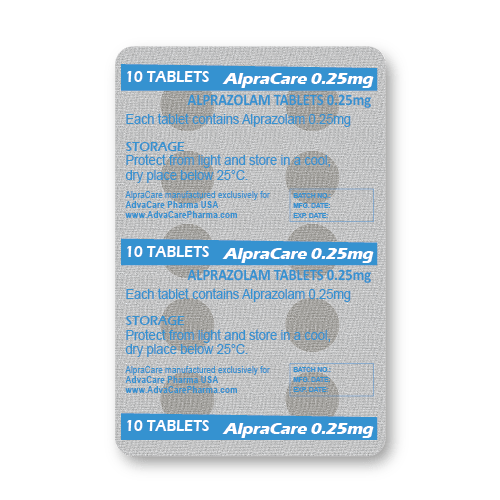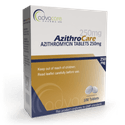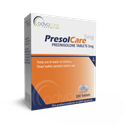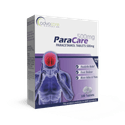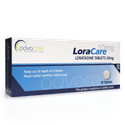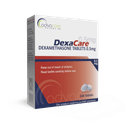- Home›
- Pharmaceuticals›
- Pharmaceutical Tablets›
- Alprazolam Tablets
Alprazolam Tablets
Dosage
Packaging
What is Alprazolam?
Active Ingredients: Alprazolam
Alprazolam Tablets are a drug used to treat the symptoms of anxiety disorder, panic disorder, and short-term symptoms of anxiety. It is sometimes used in the treatment of insomnia, depression, and premenstrual syndrome (PMS). This medication is not used to treat anxiety associated with the everyday stresses of life.
Alprazolam belongs to the subclass of benzodiazepines known as triazolobenzodiazepine and was first approved by the FDA in 1981. It acts on gamma-aminobutyric acid (GABA) receptors in the brain, which mediate neurotransmission inhibition by inducing pore opening, resulting in a rapid flow of chloride ions and synaptic hyperpolarization. Alprazolam binds to the benzodiazepine site of GABA receptors and enhances GABA-mediated synaptic inhibition. This dampening of neural excitation produces a calming effect that is beneficial for the treatment of anxiety and panic disorders.
AdvaCare Pharma is a manufacturer and exporter of Alprazolam Tablets. We offer a wide range of high-quality and cost-effective medications that are available for distribution. Our medications are produced in our GMP-certified facilities in China, India, and the USA.
Why are we a leading Alprazolam manufacturer?
As a reputable Alprazolam manufacturer, we are dedicated to ensuring that GMP guidelines and standards strictly apply to the manufacture of our entire range of 200+ pharmaceutical treatments in tablet dosage form.
AdvaCare Pharma is an American pharmaceutical company committed to the manufacture of high-quality, affordable pharmaceuticals for a global market. The extensive international network that we partner with includes pharmaceutical distributors, hospitals, pharmacies, and a variety of other medical institutions. Our vision is to manufacture Alprazolam Tablets, and other quality-assured oral solid treatments, that get into the hands of those that need them most.
Uses
What is Alprazolam used for?
It is used in the treatment of generalized anxiety disorder (GAD) and panic disorders (PDs). It may be used to treat agoraphobia, premenstrual syndrome (PMS) and premenstrual dysphoric disorder (PMDD), and anxiety caused by depression.
How should Alprazolam Tablets be used?
This medication is intended to be taken orally. Alprazolam Tablets may be taken with or without food.
What dose should be taken and for how long?
For the short-term treatment of GAD in adults, the recommended starting dose is 0.25 to 0.5mg taken three times a day. Dosage may be titrated every 3 to 4 days, with a maximum daily dose of 4mg. It is recommended that the lowest dose necessary to produce positive effects be used for the duration of treatment.
For the treatment of PD in adults, the recommended starting dose is 0.5mg taken three times a day. Dosage may be titrated every 3 to 4 days in increments no larger than 1mg a day. In clinical trials, the average daily dose was 5 to 6mg daily with some patients requiring daily doses up to 10mg. It is advised that patients receiving doses > 4mg/day receive periodic reassessment and consideration of dosage reduction.
The treatment duration needed to relieve symptoms of PD is unknown. After a period of extended relief from panic attacks, a carefully tapered discontinuation may be attempted, but this may result in symptom recurrence and/or withdrawal symptoms.
When tapering doses or discontinuing treatment, the dosage should be decreased by intervals no greater than 0.5mg every 3 days. Some patients may require an even slower dosage reduction to reduce the risk of withdrawal reactions.
The exact dosage is dependent on medical condition, response to treatment, age, and weight. Refer to a doctor or pharmacist for guidelines on dosage. Do not exceed what they advise.
Who can use Alprazolam?
Alprazolam is approved for use in adults, but caution is advised for specific groups of patients.
Pregnant Studies of pregnant people taking benzodiazepines, like alprazolam, have reported conflicting findings on the association between their use and major birth defects.
Benzodiazepines are known to cross the placental barrier and produce fetal respiratory depression, hypotonia, and sedation. Neonates born to patients using benzodiazepines late in pregnancy have reportedly experienced symptoms of sedation and/or withdrawal and should be monitored carefully. Alprazolam should only be used during pregnancy when there are no alternatives and the potential benefits to the patient outweigh the potential risk of fetal harm.
Nursing Alprazolam is excreted in human milk. Nursing infants exposed to benzodiazepines have reportedly experienced sedation, poor feeding, and poor weight gain. Because of the potential for serious adverse reactions in nursing infants, breastfeeding is not recommended during treatment with alprazolam.
Pediatric The safety and efficacy of alprazolam have not been established in pediatric patients.
Geriatric Studies suggest that adults ≥ 65 years old may be more sensitive to the effects of benzodiazepines and experience higher plasma concentrations of alprazolam due to their reduced clearance. It is recommended that older patients be started on lower doses of 0.25mg, given two or three times a day, and gradually increased if needed and tolerated well.
Other considerations
In patients with hepatic impairment, the recommended initial dosage of alprazolam is 0.25mg, given 2 or 3 times a day. This may be reduced if adverse reactions occur or gradually increased if needed and well-tolerated.
Concomitant use of benzodiazepines, such as alprazolam, and opioids are contraindicated due to the risk of profound sedation, respiratory depression, coma, and death. The concomitant use of opioids and benzodiazepines are associated with a higher risk of drug-related mortality compared to opioid use alone. If both alprazolam and opioid use are deemed medically necessary, the lowest effective dose of the newest medication should be prescribed, and patients should be closely observed for signs and symptoms of respiratory depression and sedation. Patients should be advised to not drive or operate heavy machinery until the effects of concomitant use have been determined.
Like with other benzodiazepines, there is a risk of alprazolam misuse and addiction. Misuse of benzodiazepines often involves the use of doses exceeding the maximum recommended dosage and the concomitant use of other medications, alcohol, and/or illicit substances. Benzodiazepine misuse is associated with an increased frequency of serious adverse outcomes, including respiratory depression, overdose, and death. Patients at an elevated risk for substance misuse should be thoroughly assessed before and during treatment, counseled about the risks, and initiated on the lowest effective doses.
Continued use of benzodiazepines at higher doses (> 4mg/day) may lead to clinically significant physical dependence. Sudden discontinuation, rapid dosage reduction, or administration of a benzodiazepine antagonist may result in acute withdrawal reactions, some of which can be life-threatening (e.g., seizures). Some users develop protracted withdrawal syndrome that can last weeks or months after discontinuation. To reduce the risk of withdrawal reactions, alprazolam doses should be reduced and discontinued with a gradual taper.
If ritonavir is prescribed at the initiation or duration of alprazolam treatment, the alprazolam dosage should be reduced to half the recommended or current dose. Alprazolam dosage may be increased to the effective dose after 10 to 14 days of taking both medications. In patients who have been taking ritonavir for more than 10 to 14 days, a reduction of alprazolam dosage is not necessary.
Caution is advised when treating individuals with depression, as benzodiazepines may worsen depression and suicidal thoughts and actions. Alprazolam use has been associated with hypomanic and manic episodes in some patients with depression.
In patients with severe pulmonary disease, death shortly after alprazolam treatment initiation has been reported. Patients with impaired respiratory function should be closely monitored for signs and symptoms of respiratory depression, hypoventilation, or apnea.
Side Effects
As with all pharmaceuticals, some unwanted effects can occur from the use of Alprazolam Tablets.
Common side effects include, but may not be limited to:
- drowsiness
- lightheadedness
- headache
Serious side effects may include:
- mental problems
- movement problems
- heart problems
- liver problems
After stopping treatment with this medication, seek medical attention if the following develop:
- unusual muscle movements
- sudden or severe changes in mood or behavior
- hallucinations
- seizures
- suicidal thoughts or behaviors
For a comprehensive understanding of all potential side effects, consult a medical professional.
If any symptoms persist or worsen, or you notice any other symptoms, please call your doctor immediately.
Precautions
Do NOT use Alprazolam Tablets if:
- You are allergic or sensitive to alprazolam or any other benzodiazepine.
- You are using any CYP3A inhibitors, like itraconazole and ketoconazole.
- You have a history of acute narrow-angle glaucoma.
- You are pregnant.
Alprazolam may not be suitable for people with certain conditions, so it is important to consult with a doctor if:
- You have a substance use disorder.
- You have mood disorders or suicidal thoughts and behaviors.
- You are breastfeeding.
- You have lung disease or breathing problems.
- You have kidney or liver problems.
Driving or operating machinery should be avoided, as the medication may cause dizziness or drowsiness. Alcohol can worsen these symptoms and should be avoided, as it may increase the risk of drug-related death and other serious adverse effects.
Due to possible drug interactions, consult with your doctor about any medications, supplements, and recreational drugs you are taking before your treatment.
References
Alprazolam in the treatment of generalized anxiety and panic disorders: A double-blind placebo-controlled study
This is a double-blind controlled study that lasted 8 weeks and included 50 anxious psychoneurotic outpatients with a primary diagnosis of generalized anxiety or panic disorder. The patients were randomly assigned to alprazolam (n=30), a new benzodiazepine, or placebo (n=20), after a washout period of 1 week.
The results from this study showed that alprazolam at dosages between 0.25 and 3mg/day was a better option than placebo in the treatment of either disorder.
Alprazolam in the Treatment of Panic Disorders
This is an open clinical trial that included patients with panic disorder and agoraphobia with panic attacks who were treated with alprazolam.
This study showed that many patients improved their condition with alprazolam.
Thirty patients meeting DSM-III criteria for panic disorder or agoraphobia with panic attacks completed a 12-week open clinical trial, with 22 patients classified as responders. Among the responders, panic attacks improved rapidly, while the improvement of anticipatory anxiety and phobic avoidance varied more widely. Effective alprazolam therapy seemed to prevent lactate-induced panic attacks. Patients with high pretreatment Hamilton Anxiety Scale scores tended to have a poorer treatment response.
This study indicates that alprazolam is an effective treatment for panic disorder and agoraphobia with panic attacks, primarily by directly preventing panic attacks.

You might be interested in...
Why AdvaCare Pharma?
As an industry leader, we are aware of our responsibility to provide affordable and sustainable solutions to improve healthcare worldwide.

